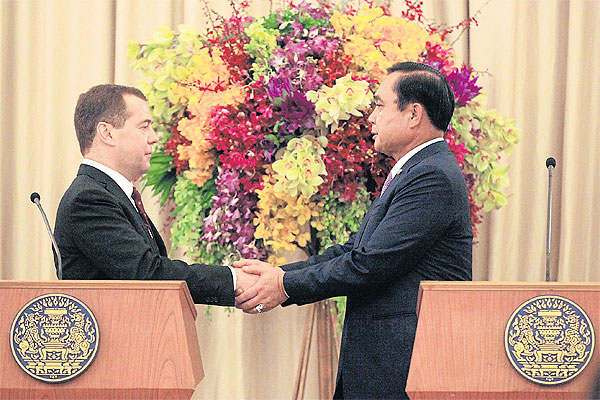
It is tempting to read too much or too little into Russian Premier Dmitry Medvedev's high-profile visit to Bangkok, hosted by the coup-appointed government of Prime Minister Prayut Chan-o-cha.
Reading too much into it would suggest Thailand is now strategically courting authoritarian major powers, namely Russia and China, in defiance of Western criticism of the coup and military regime in Bangkok. Overlooking and shrugging it off would indicate that the coup-appointed government is being expedient, dancing with the dragon, hugging the bear, but also waiting to re-engage with the West at the earliest opportunity. As is often the case in diplomacy and power politics that involve hedging and balancing, the answer is somewhere in between.
In Russia's foreign policy calculus, Mr Medvedev's visit to Bangkok and elsewhere in Southeast is part of a broader "pivot to Asia", echoing the United States which came up with this Asia-focused geo-strategy during the first administration of President Barack Obama.
Traditionally a Eurasian power that straddles Eastern Europe and Central Asia, Russia under President Vladimir Putin is reclaiming its lost glory and territory after the disintegration of the Soviet Union and its defeat in the Cold War.
But Russian assertiveness has come at a high price. Moscow's annexation of Crimea and the ongoing battle for eastern parts of Ukraine have incurred Western rebuke and punitive economic sanctions. The European and American responses have been debilitating to the commodities-based Russian economy.
Unsurprisingly, the Russians have turned to China, both North Korea and South Korea, and even Japan for succour. While the Japanese are beholden to their treaty alliance with the United States, the Chinese leadership has been accommodating to Russia. Moscow-Beijing relations are arguably the warmest since the Sino-Soviet split over competing strands of communist ideology in the 1960s-80s.
Southeast Asia was always part of the rhetoric of Russian foreign policy intentions but now it is becoming more of a reality. Apart from Vietnam, Moscow's traditional ally from the Cold War, the Russian leadership is eyeing Thailand and the other Asean relationships. Russia is desperate to ride on the coattails of Asia's rise in the 21st century, and Southeast Asia is front and centre of this ascendancy. For its part, Thailand is instrumental in Russia's geostrategic outlook because of its critical mass and location.
Along the way, this dramatic unfolding great-power realignment on the global stage bears far-reaching ramifications, pitting China and Russia as authoritarian heavyweights on the one hand and Western countries and certain Asian democracies, such as Japan, on the other. Thailand, a solid middle power when it has its act together and a fledgling developing country when it does not, is caught in the middle.
This means that whichever administration is in office in Bangkok, whether it be the previous governments of Thaksin Shinawatra's political machinery or the opposing tenure of the Democrat Party or military rule, Thailand must embrace China's rise and welcome Russia's overtures. China is the new game in the regional neighbourhood, and Russia provides Bangkok with a useful hedge in the regional geopolitical mix. What is more, China's ties with Thailand date back many centuries, while Russia proved a foul-weather friend in Thailand's hour of need in the 1890s and 1900s when European imperialists pressed against Bangkok from all directions.
But there is also a measure of what might be called Thailand's "pivot towards external authoritarianism" at work. Under a more democratically legitimate government in Bangkok, whether led by the Thaksin-controlled parties or the Democrat Party, Thailand's balancing act among the major powers would be more even-keeled because Western countries and Japan would woo Bangkok all the more in the face of aggressive Chinese and Russian suitors.
Thus, the domestic authoritarianism during the coup period reinforces Thailand's turn towards external authoritarian regimes that would do business with Bangkok's military-led government. As long as Western countries' and Japan's tough responses towards the coup and domestic authoritarian rule hold, while Bangkok is bereft of a democratically legitimate government based on popular sovereignty, Thailand's internal authoritarian rule and regime interest and pursuit of receptive and accommodating authoritarian regimes abroad will become more entrenched.
If this phenomenon does not last long and Thailand reverts to popular rule and returns to the global community of democracies, then Bangkok is likely to realign itself in the major-power mix anew at that time.
So it depends on how long the interim coup period lasts. A longer duration spells more risk of Thai authoritarianism aligning with outside authoritarian powers for the longer term. Just two decades ago, it appeared that Thailand's place in the global community of open societies, market-based economies and democratic polities was firmly secured. This is no longer the case.
However, even if the military remains ensconced in power in Bangkok for several years, it is also difficult to imagine Thailand turning into a full-fledged member of the undemocratic, authoritarian club for good.
At issue is whether Thailand's democratisation and its civil society have come far enough not to be reversible. Although military-authoritarianism has made a remarkable resurgence, a pluralistic culture, nurtured in the 1970-90s and reinforced by international norms and media technology, may have taken root enough not to be denied an open society and democratic polity.
The ultimate verdict will be manifested over the next few years. It will be a close and messy call.
Thitinan Pongsudhirak is associate professor and director of the Institute of Security and International Studies, Faculty of Political Science, Chulalongkorn University.
